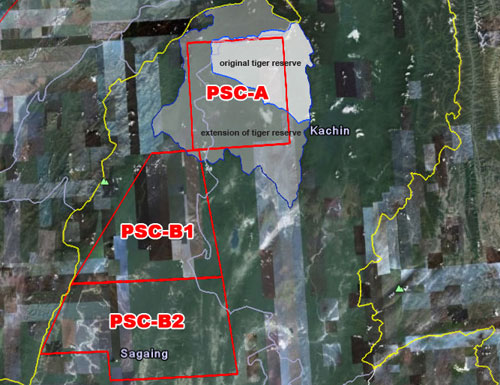The new government of Burma is allowing the destruction of the world’s largest tiger reserve, located in the Hugawng Valley, Kachin State, by making an agreement allowing the Silver Wave Exploration & Production Pte Ltd, of Singapore, to drill for oil near the reserve, according to an environmental group.
The Kachin Development Networking Group (KDNG) released a statement today saying the company and the government signed an agreement May 4th.

“On May 4, Silver Wave Exploration & Production Pte Ltd, of Singapore, announced it will commence oil drilling operations in Block B2, in Burma, within this year,” the statement said.
The company indicated Block B2 is in the Hugawng Valley in their announcement. However, on the maps of the Myanmar Oil and Gas Enterprise, Block B2 is in northern Sagaing Division, the KDNG said.
Environmentalists have strongly criticized the government for widespread deforestation in the Hugawng Valley by the Yuzana Company, which has developed sugar cane and tapioca plantations in the area. The company is owned by, Htay Myint, who is close to top Burmese military leaders
Burma attended the first global tiger summit of the International Tiger Conservation Forum, in St. Petersburg, Russia, with other twelve countries in November 2010 and pledged to double the number of wild tigers by 2022.
“If they (the government) want to be realistic (about protecting the reserve) then they have to protect the forest and work with local people,” Ah Nan, a KDNG Spokesperson, told Kachin News Group (KNG).
The Yuzana Company confiscated nearly 400,000 acres of land in the Hugawng Valley in 2006, including farms owned by local people. It razed the forest with bulldozers and backhoes, leaving only the conservation signboards standing, according to the KDNG.
The numbers of tigers in Asia has decreased in the last hundred years from 100,000 to 3,200.
Delegates from Burma, Bangladesh, Bhutan, Vietnam, India, Indonesia, Lao, China, Russia, Malaysia, Thailand, Cambodia and Nepal attended the 2010 summit, hosted by Russia Prime Minister, Vladimir Putin, to discuss for the first time on the international level how to protect and increase the tiger population in the world.
However, the KDNG criticized the presence of Burma at the summit, saying its promise was only words which had to be backed up by action.
Burma’s new President, former army general, Thein Sein, said on his inaugural speech on March 30, “The country must pay serious attention and take measures to preserve forests and conserve wildlife,” the KDNG said in its statement.
“The government’s fine words about wildlife conservation are just hot air. The tiger reserve is clearly up for sale. Investors can put money on the table. Tigers can’t,” Ah Nan said in the statement.
She said the President of Burma should keep his word and there is no possible way to protect the reserve and the local people from the oil company, which will also harm the valley, like the Yuzana Company has done.
The tiger reserve was started in 2001 with the cooperation of the US-based, Wildlife Conservation Society (WCS), and was to continue to fund wildlife conservation projects in the valley, claiming it will be a cornerstone of tiger conservation in the future, said the KDNG.


